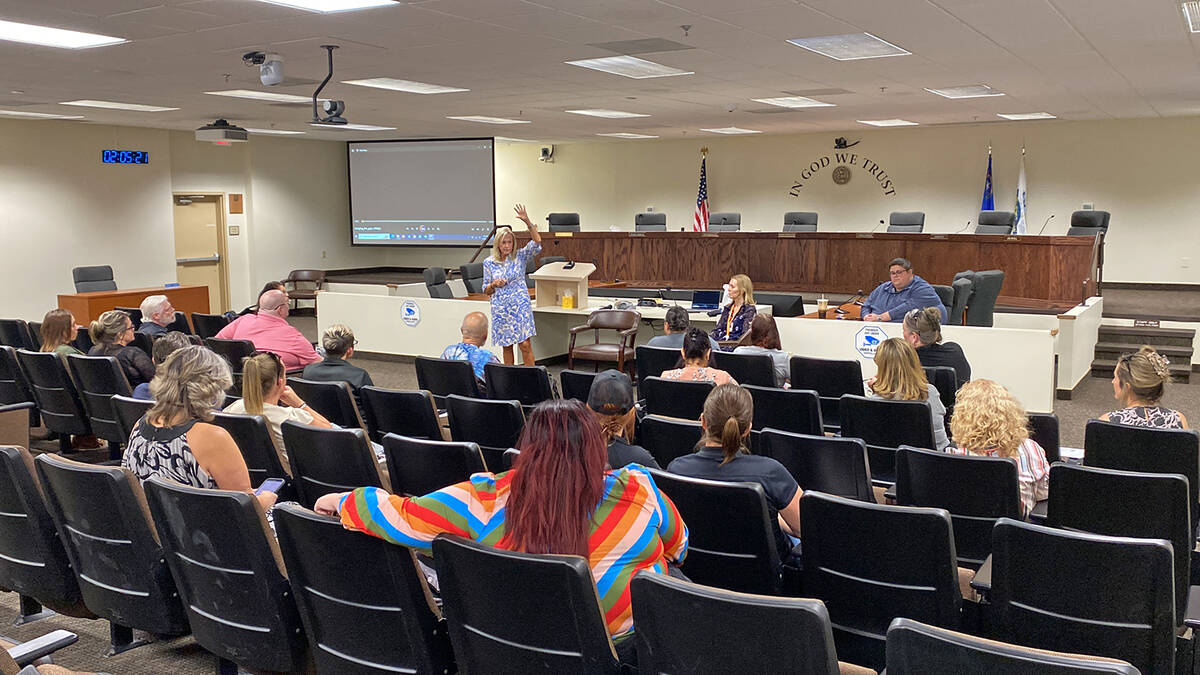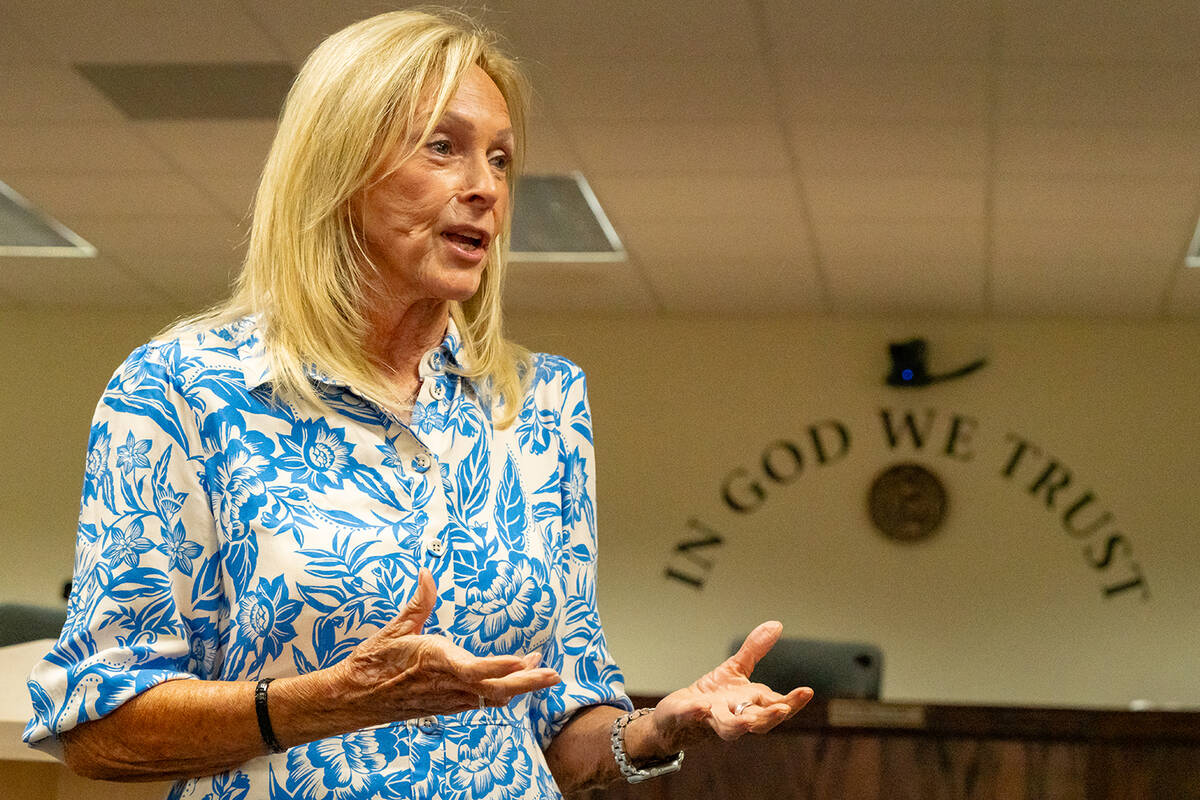Michigan judge shares hopeful message at opioid meeting
Addiction is a chronic disease.
It’s a fact that has been confirmed by medical associations all over the United States and one that Judge Linda Davis wants everyone in America to understand. Moreover, she emphasizes that people must realize substance use disorder is not a moral failing and does not deserve to be treated with the negative stigma so commonly associated with the disease.
Davis has good reason to understand the challenges faced by those with substance use disorders, not only through her work in the courts but also through personal experience. As she explained, Davis’ own daughter became dependent on opioids - through no fault of her own - and ended up struggling for years to regain stability and begin recovery.
With such a powerful message to share, last month officials at the NyE Communities Coalition invited Davis, a Michigan resident, to travel to Pahrump and share her story with the community. She began by explaining that like many people, she had once had a very different attitude toward addiction.
“I was in the prosecutors’ office for 13 years and I ran the drug unit. It was my job to prosecute the cases for anyone who came through the courts who had a drug problem,” Davis told the crowd assembled for the meeting. “I was really tough on it… I was a lock-em-up kind of prosecutor. I thought that addiction was a moral failing and that people with addiction all came from broken families and were usually bad people who were committing lots of other crimes along with their drug use. So I had a lot of bias and stigma… I had no sympathy… And I took those same attitudes with me when I became a judge.”
However, roughly 19 years ago, circumstances would intervene to teach Davis a hard lesson. It was at a time when opioid use was rising in her community, leading to deaths, overdoses and other terrible consequences.
“We had two 17-year-old boys die less than a month apart from a heroin overdose and I knew those young men, I knew their families. And then the worst of all things happened,” Davis recalled.
Davis’ own 17-year-old daughter, a driven and successful student, ended up getting injured during the course of her competitive cheerleading. The injury required surgery, after which she was prescribed pain medication that she ultimately became addicted to.
“I trusted the doctor,” Davis remarked. “I was of the generation that, if doctors told you something you take it to the bank. So when the doctor told me to give these pills to her, I had no idea what they could lead to. I was really ignorant about addiction in general.”
It took seven treatment facilities, hundreds of thousands of dollars and three years before Davis’ daughter, now a mother of two and a college student, was able to escape the grip of her addiction and move toward a stable recovery. And the journey was far from easy, giving Davis a taste of what it felt like to be on the other side of the addiction situation.
When her daughter confided in her to acknowledge her addiction, Davis immediately started calling treatment facilities.
“And boy, did I feel the stigma,” Davis said. “I was shamed, my daughter was shamed… I was mortified by the time I got off the phone.”
In a panic as her daughter began to detox and fearing she would die, Davis eventually found a way to get her daughter into a medical facility. It was while she was there that her own attitudes started to shift.
“That was my defining moment, when I knew that if we got through this, I was going to be the voice of change in the state of Michigan,” Davis explained. “So I have done a complete 180. And it’s not about me and my family - it’s about all the other people out there who don’t have half a million dollars to spend on treatment.”
Davis went on to become a Drug Court judge and she was instrumental in launching Families Against Narcotics, now known as Face Addiction Now, a nonprofit with almost two dozen chapters throughout her home state. In addition, Davis was appointed as a voting member of Michigan’s Opioid Advisory Commission in 2022. Today, she is still striving to spread the message that addiction can be best combated with understanding and education, rather than condemnation.
“If we know this is a disease, why do we treat it so differently? Why do we send people into treatment with no follow-up care?” Davis asked.
She then compared substance use disorders to diseases like type 2 diabetes, emphasizing that a diabetic who eats too much sugar should be treated no different than those who struggle with addiction.
“We’ve got this all backward. We want them to change but we need to change along with them or we’re never going to see any progress when it comes to addiction in this country,” Davis remarked.
Education and open discussion, with preconceived notions set aside and new approaches embraced, is the way forward in the continuing opioid epidemic, Davis stressed. Concepts such as harm reduction vending machines may be controversial but it’s ideas such as this that can provide the time and potential to save lives.
“Stigma runs deep in us. I have been working in this space for 17 years now and I still catch myself doing stigmatizing things and thinking stigmatizing thoughts,” Davis said. “Many of us think that you somehow choose to be addicted to substances that are going to ruin your life. We know without doubt that addiction is a disease. It wires your brain the wrong way and once the brain is wired the wrong way, you don’t think straight any longer.”
For more information on FAN visit FaceAddictionNow.org
Contact reporter Robin Hebrock at rhebrock@pvtimes.com

















